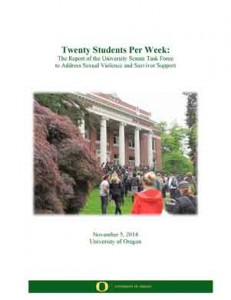 November 6, 2014—The University of Oregon Senate task force charged with studying sexual assault prevention methods at UO has released its final report, “Twenty Students Per Week: The Report of the University Senate Task Force to Address Sexual Violence and Survivor Support.” The task force, co-chaired by former CSWS director Carol Stabile (School of Journalism and Communication and Department of Women’s and Gender Studies) and Randy Sullivan (Department of Chemistry), made a series of recommendations to the UO administration concerning the institution’s handling of sexual violence. This report is partially based on a survey funded by the UO Center for the Study of Women in Society, along with private donations.
November 6, 2014—The University of Oregon Senate task force charged with studying sexual assault prevention methods at UO has released its final report, “Twenty Students Per Week: The Report of the University Senate Task Force to Address Sexual Violence and Survivor Support.” The task force, co-chaired by former CSWS director Carol Stabile (School of Journalism and Communication and Department of Women’s and Gender Studies) and Randy Sullivan (Department of Chemistry), made a series of recommendations to the UO administration concerning the institution’s handling of sexual violence. This report is partially based on a survey funded by the UO Center for the Study of Women in Society, along with private donations.
From the executive summary:
“According to the Centers for Disease Control and the White House, ‘One in five women is sexually assaulted in college,’ most often by men they know. Preliminary results of a survey at the University of Oregon show similar numbers, but with even higher numbers of women subjected to unwanted sexual physical contact by the time they graduate. More than 10,000 undergraduate women are enrolled at the University of Oregon. Applying the percentages from campus surveys, 2,000 or more of our undergraduate women experience rape or attempted rape during their college careers. Nearly 4,000 experience some kind of unwanted sexual contact. If we divide these numbers conservatively by five years (because undergraduates on average take more than four years to graduate), 400 or more additional women suffer rape or attempted rape for the first time every year – an average of 12 or more additional women during every one of the 33 weeks that school is in normal session. Including all nonconsensual sexual contact, the average is more than 20 women harmed every week who had not previously been assaulted during their university education.
“The figures on sexual harassment are even higher: 57% of female undergraduates and 37% of male undergraduates report experiencing one or more incidents of sexual harassment during their time here. Nearly half of UO’s undergraduate women will report some form of sexual violence during their years at UO.
”The problem of widespread campus sexual violence is not a new one, but national attention to the problem, inspired by campus activists, scholars, lawyers, politicians and the leadership provided by the White House has broken the silence and secrecy upon which sexual violence.
“We must not be reluctant to name sexual violence or to discuss its prevalence, even when doing so entails investigating and addressing problems within organizations that contribute to the social and cultural life of the university. We cannot ignore the fact that, despite the relatively small number of students directly involved in their activities, Athletics and Fraternity and Sorority Life (FSL) play disproportionately powerful roles in facilitating or tolerating conditions in which sexual violence occurs on campus. This observation is grounded in decades of research on campus sexual violence, review of the training materials made available to the President’s Review Panel by Athletics, the walls of secrecy that surround these cultures, their activities, and their problems, and the number of high-profile cases of sexual violence in athletics programs and Greek life nationwide that exhibit many of the same problems we are experiencing at UO.
“In order to change campus culture, support for prevention efforts should be allocated in a way that gives us the authority and resources to address the epidemic. The Task Force urges UO to use resources to become a leader in sexual violence prevention, understanding that to do so will require a strategic and transformative plan that incorporates all aspects of the university. These recommendations provide a blueprint for this plan. In January 2015, the newly formed Standing Committee on Sexual and Gender-Based Violence (see Recommendation 1.2) and its working groups will turn to the long term project of working with senior leadership to change UO’s culture and end sexual violence.”
For the full report, go to: Senate Task Force Report(final).pdf

